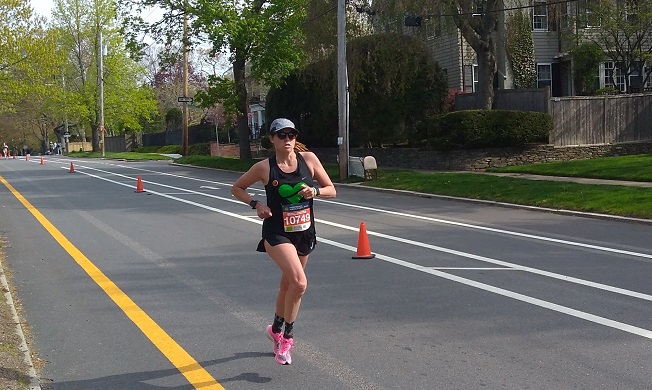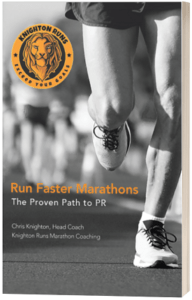Taking Time Off After A Race
The Post-Race Recovery Phase is essential to achieving better running performances
Author: Coach Chris Knighton.

Disclosure: This article may contain affiliate links. When you buy through links on our site, I may earn an affiliate commission. As an Amazon Associate I earn from qualifying purchases.
The Six Phases Of Marathon Training
- Base Building Phase
- Speed Development Phase
- Race-Specific Quality Phase
- Tapering for Peak Performance
- Race Day Performance
- Post-Race Recovery <- We will focus on this here.
Introduction – The Post-Race Recovery Phase
I am a huge believer in the importance of taking intentional time off after completing your goal race and truly shutting down your season for a few weeks. As competitive runners seeking personal bests and better performances, we are constantly looking for ways to improve. One easy way to get better in running that athletes often overlook is the importance of taking a significant break after their season’s peak race. In this article, I will share the importance of taking a full break from running at the end of every season.
Competitive adult runners, especially marathoners, typically divide their year into two main seasons. An example of this would be peaking for the Boston Marathon in April, and the Chicago Marathon in October. The runner will try to be in top shape for these two specific days. To reach this peak, they will go through 3-5 months of progressively harder training, adding in miles and more challenging workouts as the race day approaches.
Runners are in top physical condition just before the end of a season. This peak is delicate and can only be maintained for a short window of time. The excessive volume of miles and intensity of running required to reach an athlete’s peak will place significant stress on the runner. While we do our best to maintain our health with good habits and religious use of recovery tools, this stress can only be managed for so long. This high level of stress is ultimately relieved through the taper. Only then can a top performance come out of us on race day.
Regardless of the outcome of your season’s goal race, it is essential to take time off from running afterward. Taking significant rest after a peak performance allows the body to fully heal and benefit long-term from all of the hard work put in over the past months. Rushing too quickly back into running after a peak performance will likely result in performance stagnation, mental burnout, or injury.
Taking Time Off After A Race Is As Essential As Running Itself
Plan your break into your training calendar, just like you do your base building phase, workout phases, tapers, and race dates.
The reasons for this are many but here are three big ones:
- Overcome Performance Stagnation – Taking insufficient rest is one of the top reasons why avid runners do not see improvement. Forcing yourself to take a week or more off after your goal race allows your body to come off of its physical peak and reset to a more natural state. You will only detrain slightly in this time, but your “new normal” will be much higher as a result of your hard work in the last season. When you resume training you will be fully prepared to reach a higher peak in your next goal race.
- Avoid Mental Burnout – It takes ten years or more to reach your full performance potential in running and we can enjoy running for decades beyond that. Taking a mental break from running several times a year will help you have a long and healthy relationship with the sport. I don’t believe it is healthy to be going at full throttle all the time with your training. Running to your potential takes a huge commitment and planned breaks give you time to reflect and prioritize other things for a while. The time off allows us the ability to indulge in other hobbies and focus on those things we may neglect when so much of our energy goes towards our running.
- Prevent Physical Injury – Excelling at running is all about finding our limit, getting close to it in training, reaching and exceeding it in racing, and then backing off before we go over that limit for too long. Take time off from running after your race to recover completely before you start your next training cycle. This will allow you to come back stronger and more resilient for the next race. Training at your peak mileage and running a hard goal race does significant damage to our bodies whether we realize it or not. Early stages of tendonitis or stress reactions may be present that we are unaware of. We may have been nursing an injury just to get to the starting line. We may have developed a minor injury during the race itself. Force yourself to take time off whether you think you need it or not. It is to your long-term benefit to heal fully before getting back at it.
Don’t neglect the importance of the Post-Race Recovery Period or make the mistake of thinking taking time off will make you slow or out of shape. It won’t. Eliud Kipchoge, World Record Holder in the Marathon, takes two full weeks off after every marathon. If it’s good enough for the marathon GOAT, it should be good enough for you too.

It’s okay to do some easy exercise during your rest period, but don’t put structure to it. Listen to your body and do what sounds fun. Relax more, don’t push. I personally like to go on easy bike rides, take walks around my neighborhood, and do some gentle kayaking during my time away from running. Take this as an opportunity to explore and have unstructured fun. Try something fun and new during this time…. just don’t run.
How Much Time Should You Take Off After A Goal Race?
| Race Distance | Suggested Time Off Running |
|---|---|
| Marathon (26.2) | 2 Weeks Off |
| Half Marathon (13.1) | 1-2 Weeks Off |
| 5K , 10K , or Shorter Event | 1-2 Weeks Off |
| Ultra Marathon (50K+) | 2-3 Weeks Off |
The Role Of A Coach In Athlete’s Recovery
As a coach of adult distance runners, it is my practice to always assign a week or more rest at the end of every season. As athletes, we tend to think in the short term and often go against what we know is best. I have the long-term health, enjoyment, and performance gains of all my athletes in mind and would never willingly sacrifice their longevity in running by eliminating the Post-Race Recovery Period. While it may sometimes feel like an unnecessary and forced break, runners will always benefit from taking time off after a race.
Continue the conversation in the comments below
How do you implement intentional breaks into your own running?
How long do you take off after a marathon or other race distance?
Do you force yourself to take a rest day each week?
Let me know in the comments below.



